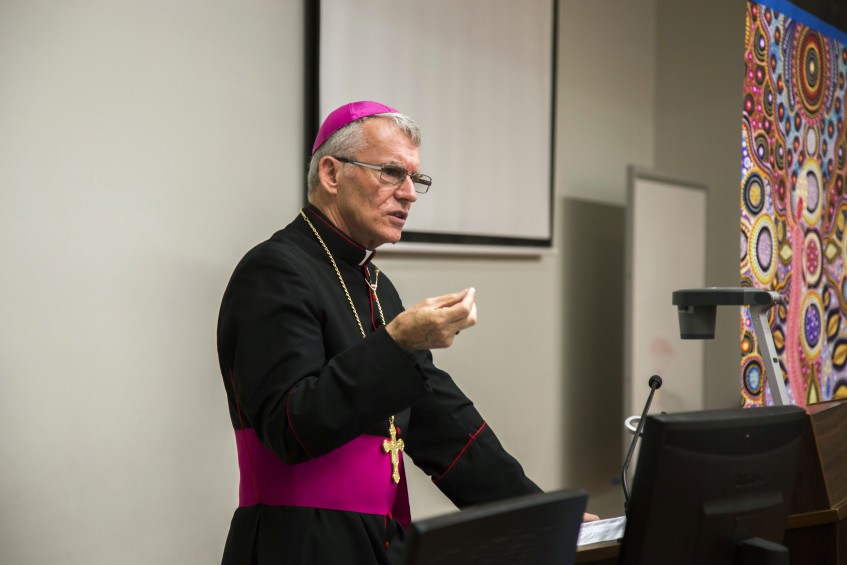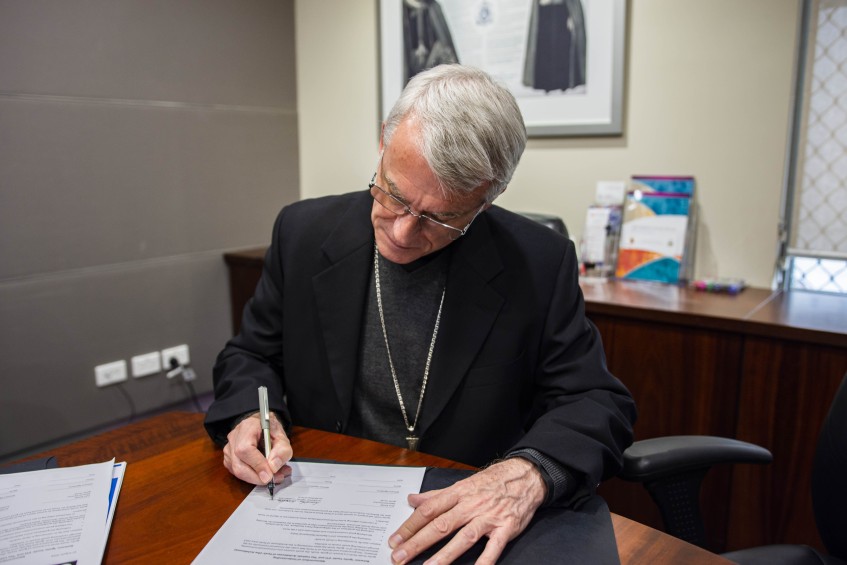Doctor-assisted suicide and euthanasia are never acceptable in a truly compassionate society – Archbishop Costelloe

Archbishop Timothy Costelloe’s comments follow the tabling of a report by the Joint Select Committee on End of Life Choices, titled “My Life, My Choice” on 23 August. Photo: Josh Low.
By Josh Low
“Whatever its motives and means, direct euthanasia consists in putting an end to the lives of handicapped, sick, or dying persons. It is morally unacceptable.
“Thus an act or omission which, of itself or by intention, causes death in order to eliminate suffering constitutes a murder gravely contrary to the dignity of the human person and to the respect due to the living God, his Creator.
“The error of judgment into which one can fall in good faith does not change the nature of this murderous act, which must always be forbidden and excluded.” – (Catechism of the Catholic Church #2277)
The Archbishop of Perth Timothy Costelloe SDB has called on all Members of Parliament to reject doctor-assisted suicide or euthanasia and to instead devote greater resources to specialist palliative and comfort care.
In addition, the Archbishop called for every Catholic to stand up for the dignity of the human person and to do what is necessary to extend compassionate life-affirming care for our most vulnerable citizens.
His comments follow the tabling of a report of the Joint Select Committee on End of Life Choices, My Life, My Choice, on 23 August in the WA Parliament.

In a statement released on 24 August, Archbishop Costelloe questioned the report by the Joint Select Committee. Photo: Josh Low.
In a statement released on 24 August, Archbishop Costelloe questioned the report by the Joint Select Committee, which declared that, “Unnecessary suffering at end of life, and broad community agreement regarding individual autonomy, form the basis for the Committee’s recommendation that the Western Australian Government draft and introduce a Bill for Voluntary Assisted Dying”.
“More than 700 submissions were received, including my own on behalf of the Catholic community in the Archdiocese of Perth,” Archbishop Costelloe said.
“Less than 36 per cent of submissions favoured the introduction of some form of doctor-assisted suicide or euthanasia, but the Committee chose to recommend that laws to permit what it calls ‘voluntary assisted dying’ should be introduced in this State.”
While the Chair of Committee Amber-Jade Sanderson MLA quoted the World Medical Association (WMA)’s “Physician’s Pledge” in the report about respecting the autonomy and dignity of patients, the very next line in the pledge about maintaining the utmost respect for human life was left wanting.
The Perth Archbishop addressed this aspect of respect for human life and dignity, saying the laws proposed in WA present a serious challenge to it.
“Doctor-assisted suicide involves authorising a medical professional to supply help so that a person can end their own life. In euthanasia, the doctor uses medical means to end the person’s life directly.
“Both of these represent a radical breach in the universal prohibition on one person killing another, which is a foundation of every civilised society,” he said.
“We must be very clear that doctor-assisted suicide and euthanasia are never acceptable in a truly compassionate society.”
He explained that compassion is the ability of one person to accompany another with great care through their journey of pain and suffering.
“Compassion challenges us to become more humane and caring people.
“Doctor-assisted suicide and euthanasia represent a surrender to despair.”
Archbishop Costelloe added that Jesus’ mission as the Good Shepherd, the one who comes “that they may have life, and have it to the full” (Jn 10:10), was to offer deep personal compassion that touched and healed every aspect of life for people who had known only diminishment through illness, fear or social marginalisation.
“We do not keep people alive at all costs, however, neither do we intentionally kill.
“To those whose lives are diminished by chronic pain and suffering, we offer the best comfort, care and pain control available – always in the context of excellent pastoral, social, and spiritual support,” he said.
“Because it focuses on the needs of the whole person, this care brings profound comfort and peace not only to the patient or resident, but also to their family and friends.”
